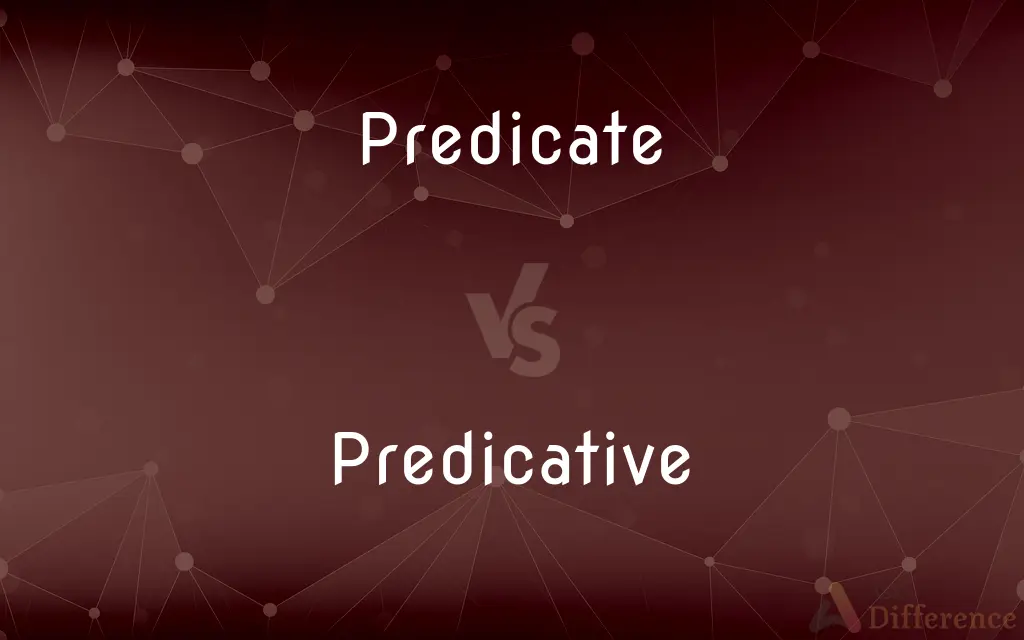Predicate vs. Predicative — What's the Difference?

Difference Between Predicate and Predicative
ADVERTISEMENT
Compare with Definitions
Predicate
To base or establish (a statement or action, for example)
I predicated my argument on the facts.
Predicative
To base or establish (a statement or action, for example)
I predicated my argument on the facts.
Predicate
To state or affirm as an attribute or quality of something
The sermon predicated the perfectibility of humankind.
Predicative
To state or affirm as an attribute or quality of something
The sermon predicated the perfectibility of humankind.
Predicate
To carry the connotation of; imply.
ADVERTISEMENT
Predicative
To carry the connotation of; imply.
Predicate
(Logic) To make (a term or expression) the predicate of a proposition.
Predicative
(Logic) To make (a term or expression) the predicate of a proposition.
Predicate
To proclaim or assert; declare.
Predicative
To proclaim or assert; declare.
Predicate
To make a statement or assertion.
Predicative
To make a statement or assertion.
Predicate
(Grammar) One of the two main constituents of a sentence or clause, modifying the subject and including the verb, objects, or phrases governed by the verb, as opened the door in Jane opened the door or is very sleepy in The child is very sleepy.
Predicative
(Grammar) One of the two main constituents of a sentence or clause, modifying the subject and including the verb, objects, or phrases governed by the verb, as opened the door in Jane opened the door or is very sleepy in The child is very sleepy.
Predicate
(Logic) That part of a proposition that is affirmed or denied about the subject. For example, in the proposition We are mortal, mortal is the predicate.
Predicative
(Logic) That part of a proposition that is affirmed or denied about the subject. For example, in the proposition We are mortal, mortal is the predicate.
Predicate
(Grammar) Of or belonging to the predicate of a sentence or clause.
Predicative
(Grammar) Of or belonging to the predicate of a sentence or clause.
Predicate
Stated or asserted; predicated.
Predicative
Stated or asserted; predicated.
Predicate
(grammar) The part of the sentence (or clause) which states a property that a subject has or is characterized by.
Predicative
Modifying a noun while in a predicate phrase, which predicate phrase is other than the noun phrase and occurs after a verb, as a predicate; contrasted with attributive.
In the sentence, ‘This house is big’, ‘big’ is predicative, whereas in ‘This is a big house’, it is attributive.
Compound adjectives are typically hyphenated in attributive position (for example, 'a high-quality scan is a must'), whereas in predicative position, many house styles specify open styling (for example, 'this scan is high quality.'
Predicate
(logic) A term of a statement, where the statement may be true or false depending on whether the thing referred to by the values of the statement's variables has the property signified by that (predicative) term.
A propositional variable may be treated as a nullary predicate.
A predicate is either valid, satisfiable, or unsatisfiable.
Predicative
(grammar) An element of the predicate of a sentence which complements the subject or object by means of the verb. Predicatives may be nominal or adjectival.
Predicate
(computing) An operator or function that returns either true or false.
Predicative
(grammar) In some languages, a special part of speech used as a predicate and denoting a state of being.
Predicate
(grammar) Of or related to the predicate of a sentence or clause.
Predicative
Expressing affirmation or predication; affirming; predicating, as, a predicative term.
Predicate
Predicated, stated.
Predicative
Of adjectives; relating to or occurring within the predicate of a sentence;
`red' is a predicative adjective in `the apple is red'
Predicate
(law) Relating to or being any of a series of criminal acts upon which prosecution for racketeering may be predicated.
Predicate
(transitive) To announce, assert, or proclaim publicly.
Predicate
(transitive) To assume or suppose; to infer.
Predicate
To base (on); to assert on the grounds of.
Predicate
To make a term (or expression) the predicate of a statement.
Predicate
To assert or state as an attribute or quality of something.
Predicate
To assert to belong to something; to affirm (one thing of another); as, to predicate whiteness of snow.
Predicate
To found; to base.
Predicate
To affirm something of another thing; to make an affirmation.
Predicate
That which is affirmed or denied of the subject. In these propositions, "Paper is white," "Ink is not white," whiteness is the predicate affirmed of paper and denied of ink.
Predicate
The word or words in a proposition which express what is affirmed of the subject.
Predicate
Predicated.
Predicate
(logic) what is predicated of the subject of a proposition; the second term in a proposition is predicated of the first term by means of the copula;
`Socrates is a man' predicates manhood of Socrates
Predicate
One of the two main constituents of a sentence; the predicate contains the verb and its complements
Predicate
Make the (grammatical) predicate in a proposition;
The predicate `dog' is predicated of the subject `Fido' in the sentence `Fido is a dog'
Predicate
Affirm or declare as an attribute or quality of;
The speech predicated the fitness of the candidate to be President
Predicate
Involve as a necessary condition of consequence; as in logic;
Solving the problem is predicated on understanding it well
Share Your Discovery

Previous Comparison
Amen vs. Ament
Next Comparison
Barbara vs. Syllogism













































